I do not often write about individual updates… partly because I never get through a daily SE Round Table round-up from Barry Schwarz without him saying there is another update. But the Helpful Content Updates seem to have totally divided the SEO world.
On the one hand, I see streams of people on Reddit saying their world is falling apart, but last week I was at SEO Spring Training in Phoenix, Arizona, and hardly anyone mentioned HCU or complained about the SERPs. Maybe they all had the bravado that they were not willing to talk about failures, but since the ticket cost thousands, I think it is more likely a chasm between people chancing their arms and people trying to build something meaningful.
Some of the SEO tools that people use might not be helping their chances of being affected heavily by updates like these (more on that later), but more important is the way in which people USE SEO tools and more recently, AI tools in general. Don’t get a plumber to do your electrics! We started seeing this issue with some users of InLinks recently, who started to try stuffing schema into every page like it was the keyword MetaTag 2001! If you combine good SEO Tools with Brain 2.0, you are going to do just fine.
Just because conspiracies exist, does not mean everything is a conspiracy. Google is indeed fighting AI on many fronts – not just in the SERPs, but as a threat to their business model and even their market share. But whilst SEOs obsess over GSC charts, the main KPI of Alphabet (Google’s parent company) is really not doing so bad:

Maybe your best bet, if you have been hit badly, is to cash out and just buy shares in Alphabet.
Here’s why you’ve been hit by HCU
The people who scream loudest about getting hammered by Google (from my limited lens) appear to be the ones who say everything Google says is wrong. My honest advice is not to listen to the conspiracy theorists. Google has a very clear page on creating helpful content. It starts with the instruction: “Self-Assess your Content”. The truth is that people are lazy, so when generative text comes along, we all have great INTENTIONS about making sure we read and check what the text says, but really, we often don’t. That’s a killer. In fact. It is SO prolific that until we find a better solution, we have added an ugly grey bar next to any AI AI-assisted content created in InLinks so that you have to go through and remove the grey bar if you want to avoid it in your published article.
HCU contains a Site-Wide Signal
I used to go around laughing at everyone talking about “DA” (Domain Authority) because the PageRank algorithm was always calculated at the URL level, not the site level. Even my own friends at Majestic use a “roll-up” to give a sitewide metric, but until now, I had not really recommended using the domain-level metrics. Now, however, Google has clearly stated that HCU includes a sitewide signal. That is a big signal to suggest that removing low-value content is probably worth accelerating… but what really counts as low-value content? That is hard to say. For example. Google’s guide asks: “Does the content provide a substantial, complete, or comprehensive description of the topic?” Some people might argue that these long-form articles are what is making Google look so bad right now! Maybe brevity has its place, but in our analyses, we see that long form articles do seem to dominate. Let’s take the top articles ranking today in the USA for “Helpful Content Update”:
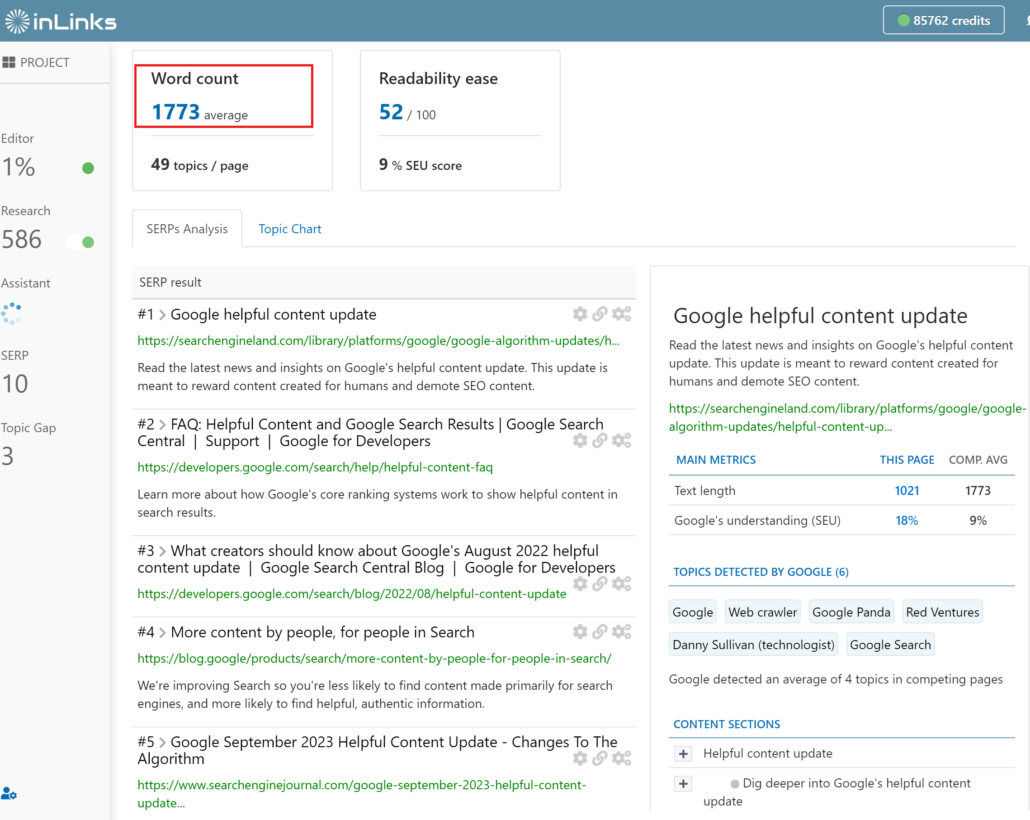
The AVERAGE word count is 1773 words. This is hardly “pithy”. Although, Google’s own result, at position 2, only has 453 words.
Adding Insight and Value
Google ask whether you add “original information, reporting, research, or analysis”. Most AI-based SEO Tools JUST scrape the top search results. That is not necessarily going to create anything new. Instead, it will just rehash what Google can already show its users. Be transparent, InLinks does this too by default, but there are a few great ways you can add information gain. For example, you can SWAP OUT some of the URLs that Google proposes are the best for any search phrase and insert something that you found that is better. In the screenshot above, click the cog icon on any result that you think is cliché or just bad. The pro-tip idea is to switch out any YouTube (or indeed Reddit) URLs, as they may not contain much-added value in the text. Instead, maybe insert the URL of a research paper from an authoritative source, which Google has trouble finding and indexing. In fact, Google emphasises this, when it says (and I quote) “Does the content provide substantial value when compared to other pages in search results?”
Knowing your Audience
Google asks you to “Focus on people-first content”. What does this mean? Well, Google pretty well explains this in the documentation, but if you are an SEO, I would add to this. Very few SEOs consider who their audience is for a piece of content. Because they start with some old-fashioned search tool that says they should write for [INSERT PHRASE HERE] because it has [X THOUSAND] searches per month with a [SOME PERCENTAGE] level of keyword difficulty, they tend to write without much regard to the audience. It’s not foolproof, but InLInks TRIES to make the writer think about this, before they are allowed to invoke the AI Assistant.

Even with a specialist term like “Helpful Content Update”, an audience of “Content Creators” might be interested in very different information than (say) Small business owners.
Just because an AI button exists, does not mean that you have to press it!
InLinks was formed AFTER Google and search started moving towards an Entity first approach, but BEFORE OpenAI came out with Chat GPT and started to change the world. This means that we already had our own transformations of content plans which made it easy for InLinks to add a “write with AI” button on all its content plans. But just because you CAN, does not mean you SHOULD.
This post, for example, is written from the heart. No AI was used in the writing of this content. However, I still created a content brief for the article. This way I can at least cut and paste my text into the InLinks editor to see if I have missed any important topics. This is very different to using an “AI first” approach to the content.
To demonstrate this, I just cut and pasted everything that I have written so far (above this sentence) into the editor… I see that I already have a “score” of 83% but I really need to talk about “Expertise” in relation to the HCU. Now, the score here is really only because some customers want to give content writers targets… but honestly, after about 80%, you need to decide whether the machine suggestions are a case of the “tail wagging the dog”? In this case… no. I probably SHOULD talk about Expertise…
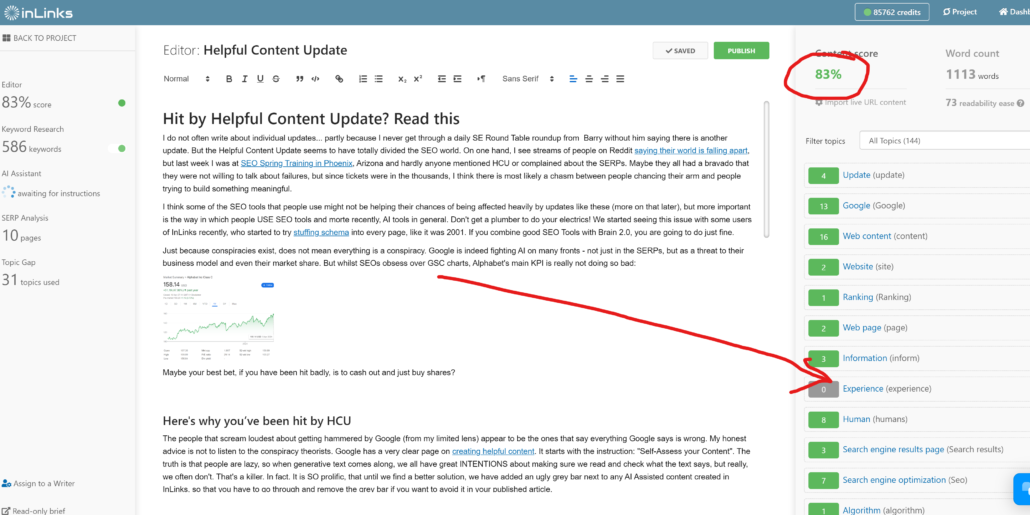
Expertise MIGHT be the Chasm that divides
I started this post by pointing out the stark difference between the fortunes of people writing in the Reddit SEO community and the people attending a specialist conference on SEO that costs thousands to attend. It may be no surprise that the Experts in SEO are not feeling the pinch so much… especially if they talk about SEO in their professional world.
When it comes to Expertise, Experience, Authority and Trust, there always has to be context! I WILL accept that Elon Musk is an authority on electric cars, space rockets and even military history (bet you didn’t know that one, huh?). But as far as I know, he has no clue or relevance in the worlds of fashion, retail, music or linguistics. OK – he now has an LLM called Grok… I hear it is a little mischievous… but he still needs to demonstrate authority in that field. Bill Gates is hardly an expert on Beyonce… You get my point (I hope)… If you are going to write about something, then it had really better be something that you are willing to AT LEAST talk about on your LinkedIn profile. Otherwise, what credibility is a search engine that aims to know anything likely to think? Almost none of the Reddit community wailing about the loss of rankings seem willing to mention the name of the site they lost rankings for. Now, I grant you that if they did, they would get crucified, however good the content is, but still – it does suggest that they are not entirely blameless or guilt-free.
Anyway – to cover the bases here – the E.E.A.T. guidelines are not a ranking factor according to Google, but when you read their developer documentation, it is clear that they are looking for evidence that these things exist… if not as a ranking factor, then perhaps as a “hygiene” factor. In other words, like site speed, you may need to have a certain threshold of authority on a subject, before you can realistically expect Google to start recommending your content above all else in any given situation.
Put it another way. The top result for “Helpful Content Update” is Search Engine Land. What do you think their chances are of ranking for the term “Beatles lyrics”?


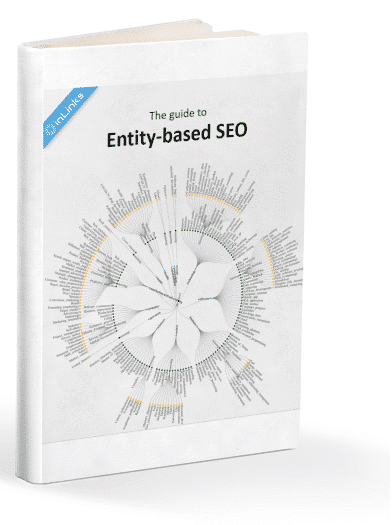
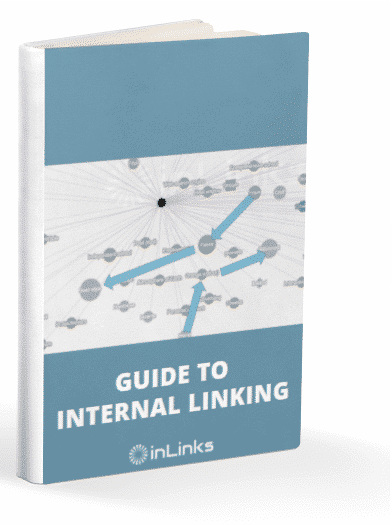
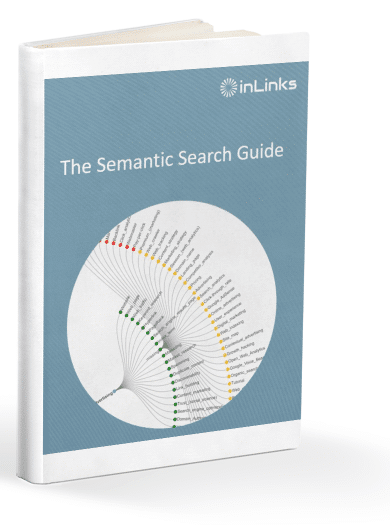
Surely SEJ can be classified for beatles lyrics without any problem, as the verge has been classified for printers.
And it is normal for HCU not to be discussed at such events, for several reasons:
– Many of the speakers don’t work SEO, they just give talks and don’t have any website.
– Others work on websites with a lot of authority that have not been affected.
>Surely SEJ can be classified for beatles lyrics without any problem, as the verge has been classified for printers
I do not think that would be so easy. Yes they would get in the index. They won’t be an authority on Beatles lyrics, though.
Leave a Reply
Want to join the discussion?Feel free to contribute!